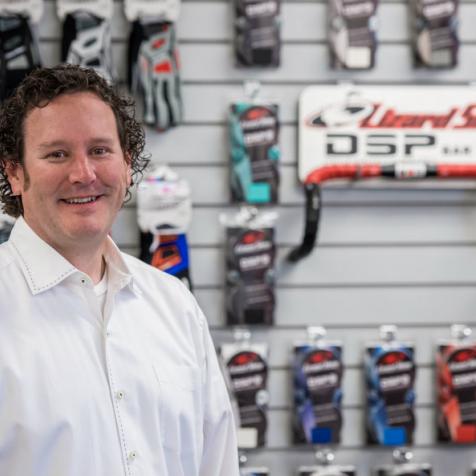
Company Details
Location
Orem, Utah
Founded
1993
Ownership Type
Private
Employees
25
Products
Grip tape for Sporting Goods
www.lizardskins.com / www.lizardskinsbaseball.com
Orem, Utah
Founded: 1993
Privately owned
Employees: 25
President Brian Fruit is driving big growth in the cycling and baseball markets with best-in-class grip tape.
In 1992, a bicycle company liquidated its inventory and Fruit saw an opportunity to do something he loved. "I took a chance and was literally selling parts out of my car and my apartment," he says. "I realized the bike industry was really cool."
Within a year, he launched Lizard Skins with Lance Larson. The first products were chainstay protectors and fork boots. The first sales cycle netted $350.
The pair slowly grew the company by going "store to store," says Fruit, then connected with an international distributor, the since-shuttered Riteway, in the mid-'90s. It was a great match: "Our product is small, so it's easy to ship, and there's not a lot of technical service or warranty work involved." Lizard Skins now sells in more than 80 countries, including the U.K., Germany, Thailand, Japan, and Australia.

Fruit bought Larson out in 2001 and sales "plateaued" until 2006. "Paying for that buyout left us pretty poor," explains Fruit, noting that the company set up a line of credit in the mid-2000s. "That helped accelerate our growth."
In 2007, Lizard Skins licensed technology from a golf manufacturer and launched a premium cycling tape. The industry's standard tape retailed for $15 or $20, says Fruit, and Lizard Skins' price tag was about $35 for DuraSoft Polymer (DSP).
"It was expensive and it was difficult," says Fruit. "A lot of retailers were hesitant to bring us in. It was a big jump for us. It was a big commitment and it was very scary."

But DSP's features and benefits proved worthy of the higher price. Rather than a single-density, foam-like material on top of a double-sided adhesive, DSP offers cyclists a beveled polymer atop a special backer and several choices of thickness (ranging from 1.8 to 3.2 millimeters), plus an opportunity for bright colors and patterns. (The status quo were very "muted" hues, says Fruit.)
The growth curve has gotten increasingly steeper. "It started slowly," says Fruit. Early adopters were followed by the Ridley Bikes team using DSP in the 2010 Tour de France. "That was a game changer." Now the company works with several teams at each Tour de France.
Since the tape's launch, Lizard Skins has "seen consistent double-digit growth all the way to today," says Fruit. "Last year and this year, it's been high double digits."
The sales boom has been catalyzed by Lizard Skins' 2012 entry into the baseball market. The first retailers liked it and consistently reordered the tape, proving the concept.

In 2013, the company teamed with Major League Baseball catcher John Buck at a trade show and got some sage advice. "He said, 'This will work for the pros if you change the thickness.'"
Fruit and company slimmed the tape down to 0.5 millimeters and Buck loved it. "We sent samples and it literally went viral," he says. "It's been unreal."
More and more Major League batters have traded their pine tar and grip sticks for DSP in the time since. The product has appeared on the cover of Sports Illustrated four times in the last two years, including one showcasing a swing by the San Francisco Giants' Hunter Pence during the 2014 World Series.
Bicycling continues to be the company's primary market, but baseball is quickly gaining. "They're both growing, but baseball is growing at a faster rate," says Fruit, crediting Lizard Skins General Manager Brad Barker with the latter trend. "He's an integral part of the business," Fruit says. "He's in his 19th year here."

Lizard Skins manufactures the DSP in China, but it makes a number of products, including chainstay protectors, in Orem and also outsources some work to contract manufacturers in Utah. "We try to manufacture as much as possible in-house, and we manufacture some products from start to finish in-house," says Fruit.
Challenges: Managing growth. "For the last 15 months, the growth has been so accelerated, it has created every sort of challenge conceivable, with staffing, financial resources, and production," Fruit says. "It's been very difficult to stay on top of it."
Opportunities: New products and markets. "With baseball, we feel there is opportunity to open up new customers and countries, and also to add new products," says Fruit. As far as other target sports for DSP, "Lacrosse would be one," he adds. "We also have our eye on hockey, field hockey, and racquet sports."
Needs: An IT upgrade. "It's a bit scary," says Fruit. "There's not a lot of people who can help transition you from QuickBooks to a next-level ERP system."
Space is another need, he adds. "Right now, Utah is in a boom and Utah County specifically has a very, very tight market for commercial warehouse space. Right now, we're having trouble finding the right-sized building to accommodate our growth."

Read about other Utah manufacturers here in the CompanyWeek Utah archive.
